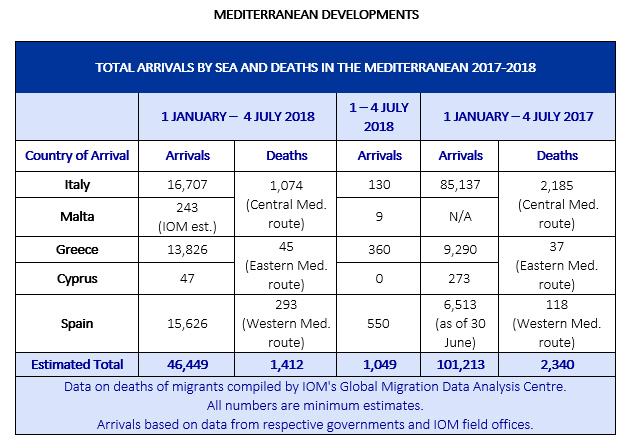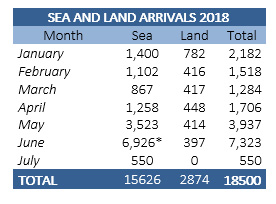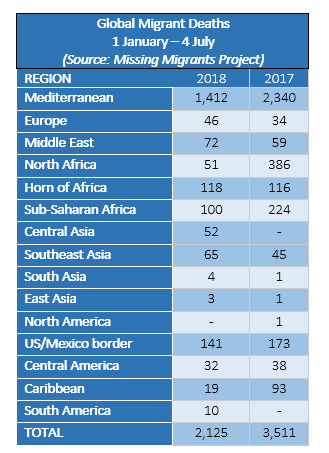-
Who we are
WHO WE AREThe International Organization for Migration (IOM) is part of the United Nations System as the leading inter-governmental organization promoting since 1951 humane and orderly migration for the benefit of all, with 175 member states and a presence in 171 countries.
-
Our Work
Our WorkAs the leading inter-governmental organization promoting since 1951 humane and orderly migration, IOM plays a key role to support the achievement of the 2030 Agenda through different areas of intervention that connect both humanitarian assistance and sustainable development.
What We Do
What We Do
Partnerships
Partnerships
Highlights
Highlights
- Where we work
-
Take Action
Take Action
Work with us
Work with us
Get involved
Get involved
- Data and Research
- 2030 Agenda
Mediterranean Migrant Arrivals Reach 46,449 in 2018; Deaths Reach 1,412
Geneva – IOM, the UN Migration Agency, reports that 46,449 migrants and refugees entered Europe by sea through the first half of 2018. That total compares to 101,213 at this time last year, and over 231,503 at this time in 2016.

IOM Rome’s Flavio Di Giacomo reported Friday that arrivals of irregular migrants to Italy thus far in 2018 are less than one-fifth (19%) the total arriving through mid-year 2017, and less than one-fourth (24%) the total through mid-year 2016. The downward trend appears to be accelerating (see chart below): monthly arrivals to Italy this year have topped the 4,000-person mark just once, in January. For the previous two years, monthly arrival totals to Italy regularly exceeded 10,000, and 20,000 during summer months.

Nonetheless, irregular sea passage across the Mediterranean’s central route remains treacherous. IOM’s Missing Migrants Project has recorded 1,412 people now have lost their lives at sea in the Mediterranean since the beginning of the year.

Since 18 June, 489 people have tragically died or gone missing in the Central Mediterranean off the coast of Libya. Most recently, the remains of six migrants were recovered by the Libyan Navy from a rubber boat on 3 July, while 125 people who survived the shipwreck were disembarked at the Tripoli Naval Base.
IOM Madrid’s Ana Dodevska reported Thursday that total arrivals at sea in 2018 have reached 15,626 men, women and children, irregular migrants who have been rescued in Western Mediterranean waters through 4 July.
Nearly half of all landings – 7,476 people – arrived just in the past 34 days. Moreover, sea arrivals to Spain by irregular migrants already are over 70 per cent of all of 2017 arrivals, and exceed the arrivals of 2015 and 2016, combined (see charts below).

*Source: Spanish Ministry of Interior
*The figures for June 2018 include the migrants who disembarked in Valencia from the Aquarius boat – total of 630 migrants
- SEA ARRIVALS 2015-2018:

*Source: Spanish Ministry of Interior
*The figures for June 2018 include the migrants who disembarked in Valencia from the Aquarius boat – total of 630 migrants
*Source: Spanish Ministry of Interior
*The figures for June 2018 include the migrants who disembarked in Valencia from the Aquarius boat – total of 630 migrantsIOM Athens’ Christine Nikolaidou says IOM has learned that that from Monday through Wednesday (2-4 July) the Hellenic Coast Guard (HCG) reported there were at least five incidents requiring search and rescue operations off the islands of Chios, Lesvos, Samos and Kos. The HCG rescued a total of 144 migrants and transferred them to those respective islands.
Another 175 migrants were reported landing at Oinouses and elsewhere, bringing to 319 the total number of arrivals between those three days. Through that date the total number of sea arrivals to Greek territory since 1 January is 13,826 (see charts below).

* Unofficial data collected by IOM Greece and the Greek authorities of arrivals by sea.

IOM Regional Displacement Tracking Matrix researcher Ivona Zakoska reported Thursday that data collected from the Western Balkans indicate a quadrupling of registered irregular entries in Albania, Bosnia and Herzegovina and Montenegro in the second quarter of 2018 when compared to the same period in 2017.
Since the start of the year, authorities in these three countries reported almost 11,000 new migrants entering these respective countries irregularly. The majority of the arrivals – some 70 per cent (a total of 7,548) – were registered by authorities in Bosnia and Herzegovina. Pakistan is the most common country of origin reported in Bosnia and Herzegovina this year, followed by irregular migrants who reported Syrian nationality, with Afghan and Iranian nationals the other large groups. Besides those from Pakistan, Syria, Iraq and Afghanistan, some 28 per cent of all individuals registered among these irregular migrants belong to more than 40 different nationality groups.
Authorities in Montenegro registered a total of 2,000 irregular migrants, more than a ten-fold increase compared to 187 registered at the end of the second quarter of 2017, and 2.5 times more than the yearly total of 807 reported for the whole of 2017. Almost half of all irregular migrants registered this year were of Syrian origin (44%), followed by those from Pakistan (17%) and Algeria (11%). Available data for the second quarter of 2017 shows a decrease in presence of migrants from Afghanistan (from 17% in 2017 to 2% in 2018) and Cuba (72 people in 2017; four individuals in 2018).
In Albania, an estimated 1,233 irregular migrants were registered upon entry to the country between January and June 2018, an eight-fold increase compared to 146 registered in the same period last year and almost double the 752 reported for the whole of 2017. More than half of the registered population were of Syrian origin (57%), followed by those from Pakistan (10%) and Iraq (8%). A similar composition of nationalities was registered in the same period last year, with the exception of an increase in the number of Iraqis (2% in 2017 and 8% in 2018) and a decrease in the number of migrants from Afghanistan (18% in 2017 versus 3% in 2018).
Further on, between March and June DTM field colleagues reported the apprehension of 590 irregular migrants who were trying to exit the country towards Montenegro – mainly Syrian (43%) and Pakistani (30%) nationals.
In addition to an increase in movements through the Western Balkans, Croatian and Slovenian police reported more than 15 incidents leading to arrest of 15 individuals suspected of smuggling migrants inside the territories of the respective countries. More information is available here.

Worldwide, IOM’s Missing Migrants Project has recorded 2,125 people who died or went missing while migrating in 2018 (see chart below).
In Southeast Asia, nine people died – including two women – and 12 have gone missing in the waters between Indonesia and Malaysia on 1 July. Twenty-five Indonesian nationals were rescued after the boat in which they were traveling from the Indonesian island of Batam to Tanjung Penawar in Malaysia’s state of Johor capsized. According to survivors’ testimonies, there were 44 people on board. The remains of nine migrants were recovered during a three-day search-and-rescue effort which is still ongoing. Tragically, the 10 people who remain missing are presumed dead.
Additionally, the Missing Migrants Project team recorded another death on the US/Mexico border, where the remains of a Honduran migrant were recovered from the Río Bravo near Piedras Negras, Coahuila on 3 July.
Missing Migrants Project data are compiled by IOM staff but come from a variety of sources, some of which are unofficial. To learn more about how data on migrant deaths and disappearances are collected, click here.
Download the Latest Mediterranean Update infographic here.
For latest arrivals and fatalities in the Mediterranean, please visit: http://migration.iom.int/europe
Learn more about the Missing Migrants Project at: http://missingmigrants.iom.intFor more information, please contact:
Joel Millman at IOM HQ, Tel: +41 79 103 8720, Email: jmillman@iom.int
Flavio Di Giacomo, IOM Coordination Office for the Mediterranean, Italy, Tel: +39 347 089 8996, Email: fdigiacomo@iom.int
Hicham Hasnaoui, IOM Morocco, Tel: + 212 5 37 65 28 81, Email: hhasnaoui@iom.int
Kelly Namia, IOM Greece, Tel: +30 210 991 2174, Email: knamia@iom.int
Ivona Zakoska, IOM Regional DTM, Austria, Tel: +43 1 5812222, Email: izakoska@iom.int
Julia Black, IOM GMDAC, Germany, Tel: +49 30 278 778 27, Email: jblack@iom.int
Christine Petré, IOM Libya, Tel: +216 29 240 448, Email: chpetre@iom.int
Ana Dodevska, IOM Spain, Tel: +34 91 445 7116, Email: adodevska@iom.int
Myriam Chabbi, IOM Tunisia, Mobile: +216 28 78 78 05, Tel: +216 71 860 312 (Ext. 109), Email: mchabbi@iom.int